What Gauge Extension Cord for a Refrigerator?
Author: Omar Alonso | Editor: Omar Alonso
Review & Research: Jen Worst & Chris Miller
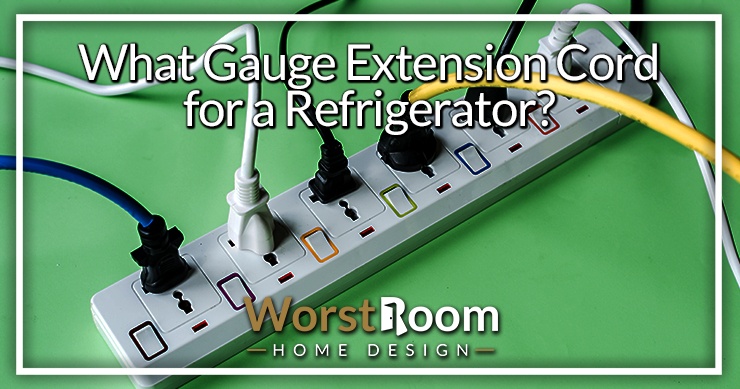
Are you thinking about putting the refrigerator in the garage? What if there's no power point nearby? Can you run a refrigerator on an extension cord? Typically, manufacturing brands recommend not running a fridge on an extension cord. But if you do, what gauge extension cord for a refrigerator is acceptable?
But using an extension cord to run your fridge is possible if you have the right gauge. So, what gauge extension cord for refrigerators ensures your appliance's safe, effective operation? Usually, you'll need an extension cord rated 50% above the current and fuse for the alliance.
The extension must be as short as possible, properly insulated, and have a 14-gauge thickness. Let's look at the specifics of choosing the right gauge extension cord for setting up your refrigerator.
Understand Extension Cord Gauges
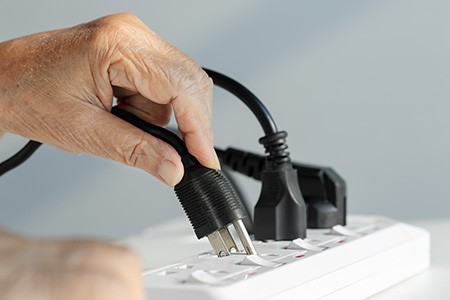
If you're setting up any types of fridges in the kitchen or the garage, we recommend using a 14-gauge extension cord for the job. Provided the refrigerator only needs 15 amps, and the extension cord is at most 9 feet, a 14-gauge cord is more than sufficient. If we're talking about a mini-fridge, though , you can use a regular outlet. Just don't put the mini-fridge on raw carpet.
For fridges requiring more amps and extensions longer than 9 feet, you'll have to go with a 10 or 12-gauge for a heavy-duty option. This extension will handle up to 125 volts and must feature a three-prong plug. The extension must have sufficient insulation and be UL certified for optimal safety standards.
Determining Power Ratings on Extension Cords
Finding the right extension cord for your fridge requires you to know the definitions of the following three terms.
Amps
The amps of the extension cord refer to the ampere unit of measurement and the current coming from the conductor. Many homeowners confuse this term with "amperage," but amperage refers to measuring electrical current in amps.
Broadly speaking, electrical devices use amps to measure the speed at which the electricity runs through the electrical components, chiefly the wiring. The amperage changes with the gauge of the extension cord. Smaller, higher-gauge wires carry fewer amps.
Watts
Watts are a unit of measurement of the electrical power generated by a device. The average home fridge uses between 350 to 780 watts. This means a power strip can cater to these power requirements, preventing problems like shorts and circuit overloads.
Volts
A volt is a standardized unit of measurement defining the electrical potential of electrical devices. After noting the amps and watts of an electronic device like a fridge, you can determine the power rating for the appliance.
This number sometimes appears on the packing or body. However, if it's unavailable, you can use the calculation watts = amps x volts to get an answer.
Understanding the Letters on Extension Cords
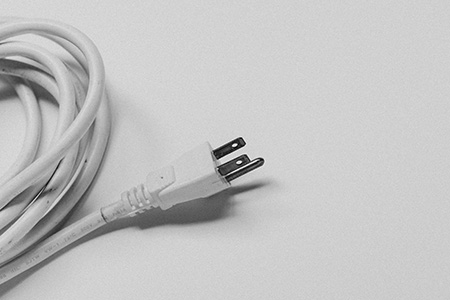
The jacket of your extension cord typically features a letter designating the purpose of the extension cord and its suitable use. Here's a quick guide to understanding the letters and their meanings.
- S - Suitable for general-purpose use.
- W - Suitable for outdoor use.
- J - An extension cord insulated and rated to 300 volts.
- O - Oil-resistant extension cord.
- SRDT - Durable, rugged cord suitable for high-current devices.
It is of absolute importance that you respect these labels and never stray outside of the intended and directed usage.
Before You Start – Safety Concerns
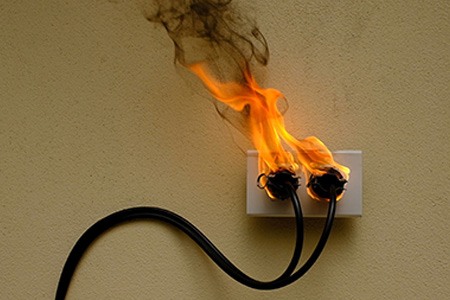
Before discussing the right extension cord for your fridge, it's important to understand the hazards of using an undersized cord. Picking the wrong extension for the task leads to overheating of the wires and the potential of starting an electrical fire.
An electrical fire happens when the wires can't handle the current moving through them, generating heat as the wire tries to cope with the over-demands of the current. In many instances, using undersized wiring and electrical fire can lead to a house fire and a loss of life in some cases.
Using an undersized extension cord with your fridge forces the appliance to work harder since it's underpowered. As a result, the refrigerator will burn out and require repair or replacement.
Does the Extension Cord Length Matter?
Yes, the length of the extension cord matters. The longer the extension, the less current and load it can handle. That's why we recommend sticking to a 14-gauge cord and a maximum length of 9 feet for the extension. A refrigerator may be heavy, but move it if you need to move it.
Ensure There's a Ground
The extension cord must accept a three-prong plug. The three-prong plug has a ground in it. Never use a two-prong extension cord, as it leads to huge problems with the fridge and the extension cord.
Use a Low-Profile Plug
Most refrigerators require butting against a wall in the kitchen. If you're using this type of installation, go with a low-profile plug for the task. The low-profile design gives it room to fit in the outlet.
We recommend going with a low-profile plug featuring a 90-degree turn to the right before the plug prongs. This design takes up less space and allows the cord to run along the wall to the fridge. It keeps these thicker cord plugs from being kicked by accident. What gauge extension cord for a refrigerator are we talking about? Go for a 14-gauge and keep it as short as you can, no longer than 9 feet.
Can You Use a Multi-Socket Adapter or Socket Multiplier?
No, it's better to stick with the single-socket over the multi-socket option. Fridges produce huge transient electrical loads. If you use a multi-socket adapter, you risk overloading the outlet and cord. Let me be explicit. Do not use an adapter in order to use a 3 prong cord with a 2 prong outlet.
As a result of not taking this advice, you might experience an intermittent disconnection, resulting in spoiling food in the fridge, as a minimum. It's not something many people think about, but it's a valid concern for homeowners to prevent their fridges from disconnecting and spoiling food, costing them money.
Instead of using an extension cord in the kitchen to power the fridge, think about using a socket multiplier. This "brick-like" extension plugs into the wall outlet, giving you several new outlet points to plug in the fridge and other appliances. A socket multiplier removes the risk of overpowering the extension cord.
Important Concerns for Running a Fridge on an Extension Cord
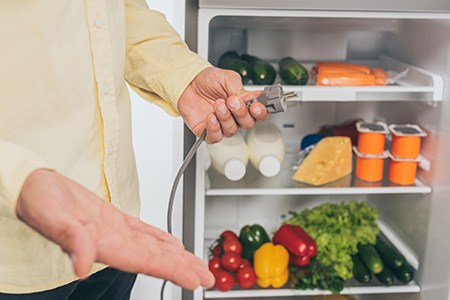
Plugging the refrigerator into the extension cord is usually a straightforward practice. However, it could lead to disaster if you don't understand the risks of running a fridge off an extension cord. Ensure you follow these general guidelines for running a refrigerator off an extension cord.
- Only purchase and use certified extension cords with UL listings and safety ratings.
- Measure the distance from the outlet to the refrigerator before finalizing your extension purchase.
- For instance, a 12-gauge wire only transfers the 15 amps required by the fridge for a 100-foot distance.
- With the same distance, a 10-gauge extension will handle 20 amps.
- Note the ratings in this post apply to runs shorter than 50 feet.
- Use polarized power strips with three-prong plugs to reduce the risk of damage to the fridge in the event of a power surge.
- When disconnecting the extension from the wall, pull from the plug, not the wire.
- If the extension feels hot while the fridge is in use, immediately disconnect it from the outlet.
- Avoid using power strips with damaged extension cords.
One thing to understand here is we’re not talking about using a basic extension cord. You need an appliance extension cord that is be able to accommodate the electrical demands of the fridge. Also, don't strip the wire or do any alterations to it yourself.
Is It Safe to Run a Fridge Using a Generator?
Yes. Running a fridge on a generator is usually fine without causing a fire hazard or damaging the appliance. However, you'll need to ensure the power usage of the refrigerator is within the generator's capacity.
Follow these guidelines to prevent issues with connecting a fridge to a generator.
- Calculate the fridge's wattage.
- Calculate the maximum wattage of the generator.
- The wattage of the generator should exceed the refrigerator.
- Ensure the generator is off before plugging in the fridge.
- Connect the fridge to the outlet on the generator.
- Turn on the refrigerator.
With a refrigerator extension cord, meaning one intended for the job, you’ll have no problems.
FAQ’s Regarding an Extension Cord for a Refrigerator
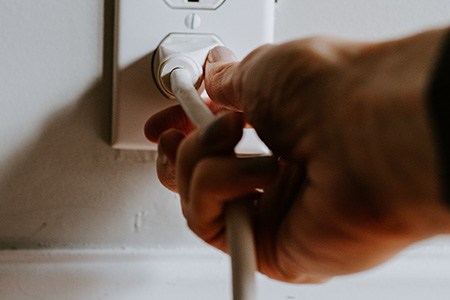
An extension cord for a fridge seems like a simple thing, but if you really want to dig into the details (and we do) then there’s quite a few questions that can arise. Let’s cover those now.
Can You Plug a Microwave & Fridge Into the Same Extension Cord?
You'll have to make the decision to run one or the other. Plugging both appliances into a power strip is a bad idea. It might cause excessive wear and tear in the devices, reducing their service life. So while you can plug a microwave into an extension cord, you need use the proper ones and not share it with another appliance.
Can You Connect Extension Cords Together?
No. Never connect extension cords together to run a fridge. You'll end up creating a fire hazard by overloading the extensions.
Do I Need to Run My Fridge on a Dedicated Circuit?
Manufacturers recommend running a fridge on a dedicated circuit since a refrigerator can have peak power demands of up to 15 amps.
Do Refrigerator Manufacturers Recommend Using Extension Cords to Power a Fridge?
General Electric and other manufacturers strongly recommend against using extension cords with refrigerators or refrigeration appliances like compact fridges, freezers, ice machines, and beverage chillers. Using an extension cord could potentially create a safety hazard.
How Long Do I Have to Wait to Plug it in After Moving My Fridge Around?
If you transported the fridge upright, give it at least an hour for the gas in the compressor to settle before plugging it in and turning it on. If you transported the fridge horizontally, wait up to four hours before plugging it in. Failing to give the gas enough time to settle might damage the compressor when you turn it on.
What Gauge Extension Cord for a Refrigerator is Corrrect?
It's better to avoid running a fridge on an extension cord if you can. If you must use an extension cord, use a 14-gauge cord with a 15-amp rating. Run the fridge on a dedicated circuit and use a three-prong plug. If the extension ever feels hot, disconnect it from the outlet immediately.
So can you plug a refrigerator into an extension cord? Yes, but it must be a refrigerator extension cord meant for appliances. What gauge extension cord for a refrigerator is correct? A 14-gauge cord with a 15-amp rating is what is suggested.



